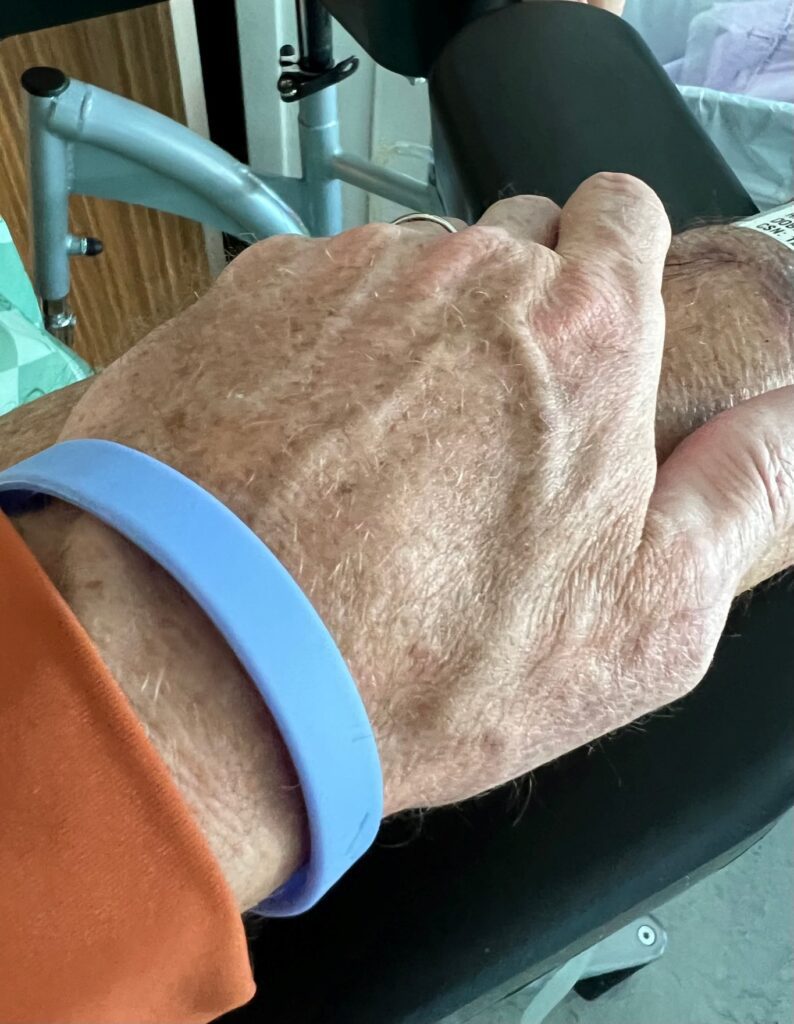Uncertainty
Her large, compassionate eyes blink slowly and in earnest just above her surgical mask. The blue mask almost matches the hospital scrubs she wears and the Emory Healthcare logo stenciled on the hallway wall. A prominent badge with the Emory logo hangs from her neck and tells me her name.
Madonna.
It’s the morning after my father’s lengthy surgery. Madonna sits at the nurses’ station in the ICU, just outside his room. She has a few minutes left in her 12-hour shift.
“He had a good night and he’s doing very well,” she says. “It’s remarkable, really. I can’t believe he’s 80.”
The persistent heaviness in my chest from the long restless night eases, and the innumerable “what ifs” begin to fall away.
“Thank you for taking such good care of him,” I say, hoping my eyes convey gratitude. I am aware that my father has a long and demanding recovery ahead.
I peer into the room where he sits in a recliner taking a nap. Half a dozen or more wires and tubes attached to different parts of his body provide important information displayed on a monitor above his head. Two bags of fluid hang from a stainless-steel pole and drip medicines into his veins.
Vulnerability
My mind drifts back to the previous day when the team prepped him for surgery. My father told a doctor, “I’m ready. I trust you, my family, and my Lord. I know I’m in good hands.”
I linger there, in that memory, thinking about trust.
Trust seems to hold the status of both a universal want and need for human beings, and yet it doesn’t always come easily. It can be fragile. It can be elusive. Maybe that’s because we’ve trusted someone and experienced the pain of betrayal. Perhaps, we naturally gravitate toward self-reliance, such that we deem life to hinge less on trusting others and more on trusting ourselves. Maybe we fear the level of intimacy that trusting another person requires. Whatever the reasons, for some of us, making the emotional move toward reliance on others as truly trusting them requires proves difficult.
At times, it has been difficult for me.
Trust requires risk, too, because trust comes from a vulnerable place. Trust requires yielding a measure of control, opening ourselves to outcomes we may not want or foresee, and relying on trusted others to provide what we want or need.
The degree to which we yield control varies, as does our measure of vulnerability. The vulnerability of a surgical procedure differs from that of sharing what’s on our hearts. Moreover, when we are vulnerable we yield control assuming that we will reclaim it as we have the need. My father had the right to say stop this now before the surgery began.
But he decided to be vulnerable. To place his trust in his medical team, his family, and his Lord. Lying in a hospital bed with the power to assign his care and his life to others, he made the decision to trust.
Trust
For nearly six years, Parkinson’s has invited me to become more trusting—more trusting of doctors and medical staff, family members and friends, colleagues and students, neighbors, and even the occasional stranger. Surprisingly, Parkinson’s also invited me to be more trusting of myself. It’s helped me lean into the belief that my life compass can be relied on—trusted—to point in the right direction. Due to its progressive nature that leaves me increasingly vulnerable, Parkinson’s invitation to trust persists.
It’s now two days after his surgery, and I join my father’s nurse, Umou, to help him take his first steps. With those same wires and tubes still attached and his IV bags rolling on the stand beside him, he walks slowly and deliberately down a different hallway, past the Emory Healthcare logo and the nurses’ station. Madonna is no longer there, but Umou is, and Rose, Fatmata, and Masatta. My mom is there, too, and so are my wife and our daughters via FaceTime, all of us vulnerable in our own ways, each of us trusting to the extent we can, pulling for my dad and cheering him on.
I recall what Madeline L’Engle said, “When we were children, we used to think that when we were grown-up we would no longer be vulnerable. But to grow up is to accept vulnerability… To be alive is to be vulnerable.”
I look over at my dad, who’s sleeping, place my hand on his arm, and close my eyes.
__________
Allan Cole is Dean of the Steve Hicks School of Social Work at The University of Texas at Austin, where he also serves as the Bert Kruger Smith Centennial Professor in Social Work and, by courtesy, as Professor of Psychiatry and Behavioral Sciences at the Dell Medical School. Diagnosed with Parkinson’s in 2016, at the age of 48, he is the author or editor of many books on a range of topics related to chronic illness, bereavement, anxiety, and spirituality. His latest books are Discerning the Way: Lessons from Parkinson’s Disease (Cascade), In the Care of Plenty: Poems (Resource Publications), and Counseling Persons with Parkinson’s Disease (Oxford University Press). Follow him on Twitter @PDWise.

